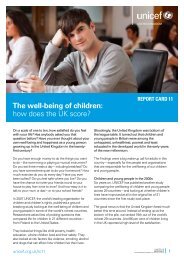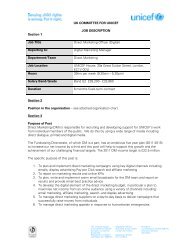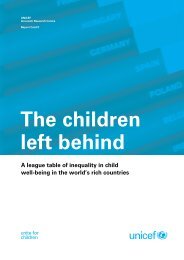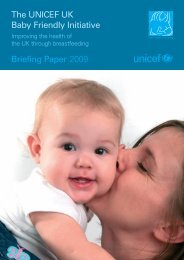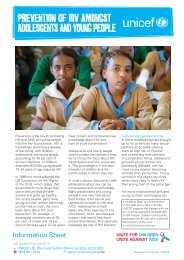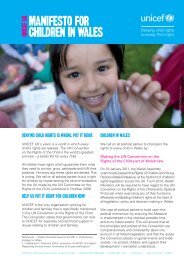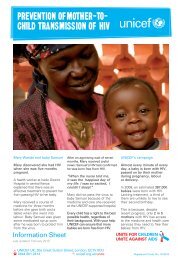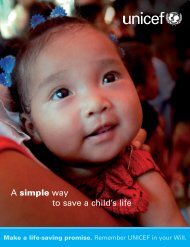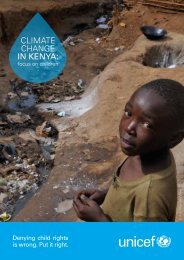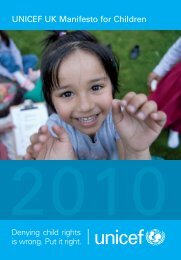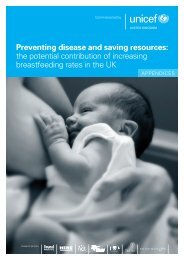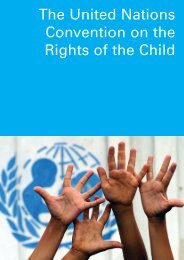UNICEF UK Trustees Report and Financial Statements 2010
UNICEF UK Trustees Report and Financial Statements 2010
UNICEF UK Trustees Report and Financial Statements 2010
Create successful ePaper yourself
Turn your PDF publications into a flip-book with our unique Google optimized e-Paper software.
The United Kingdom Committee for <strong>UNICEF</strong><br />
<strong>Report</strong> of the <strong>Trustees</strong><br />
For the year ended 31 December <strong>2010</strong><br />
Activities <strong>and</strong> achievements in <strong>2010</strong><br />
We have structured the reports of <strong>UNICEF</strong> <strong>UK</strong>’s achievements in <strong>2010</strong> according to<br />
<strong>UNICEF</strong>’s five key global priorities for children.<br />
a. Young child survival <strong>and</strong> development<br />
Every child has the right to survive <strong>and</strong> to be as healthy as possible. Yet every hour<br />
of every day, more than 1,000 children under the age of five die 1 . Simple, low-cost,<br />
solutions can prevent most of these deaths. Every year, <strong>UNICEF</strong> saves the lives of<br />
many children by vaccinating against illnesses such as measles, providing proper<br />
food <strong>and</strong> clean water, enabling mothers to receive proper health care during<br />
pregnancy, <strong>and</strong> supplying families with mosquito nets treated with insect repellent.<br />
Simple solutions save lives. In support of Millennium Development Goal 4, by 2015<br />
<strong>UNICEF</strong> aims to reduce the mortality rate of children under the age of five by<br />
two-thirds.<br />
<strong>UNICEF</strong> <strong>UK</strong> committed £9.3 million to support our vital work in child survival <strong>and</strong><br />
development in the developing world – preventing the needless deaths of babies<br />
<strong>and</strong> infants below the age of five.<br />
Tetanus<br />
Every year, maternal <strong>and</strong> neonatal tetanus (MNT) kills around 59,000 newborn babies<br />
<strong>and</strong> a significant number of mothers. 2 Caused by tetanus spores present in<br />
unsanitary conditions during childbirth, the disease spreads rapidly throughout the<br />
body. <strong>UNICEF</strong> has helped make great progress in the global drive to eliminate deaths<br />
from MNT.<br />
For the fifth consecutive year, <strong>UNICEF</strong> <strong>UK</strong>’s partnership with Procter <strong>and</strong> Gamble<br />
has supported MNT immunisation. In the last three months of <strong>2010</strong>, the ‘one pack<br />
one vaccine’ campaign in conjunction with Pampers <strong>and</strong> other Procter <strong>and</strong> Gamble<br />
br<strong>and</strong>s, donated the cost of one tetanus vaccine to <strong>UNICEF</strong> <strong>UK</strong> for every pack sold.<br />
<strong>UK</strong> retailers such as Tesco <strong>and</strong> Morrisons also supported the campaign. In total, the<br />
initiative provided more than 41.5 million vaccines, helping to save the lives of many<br />
thous<strong>and</strong>s of mothers <strong>and</strong> babies.<br />
End Water Poverty<br />
Every day more than 4,000 children die of diseases caused by poor sanitation <strong>and</strong><br />
dirty water. Nearly one in five deaths of children under the age of five is due to<br />
diarrhoea. Throughout <strong>2010</strong>, <strong>UNICEF</strong> <strong>UK</strong> campaigners continued to urge the <strong>UK</strong><br />
Government to support the global initiative on Sanitation <strong>and</strong> Water for All. On World<br />
Water Day (22 March), we took part in the world’s longest toilet queue to highlight<br />
1 Inter-agency Group on Child Mortality, 2008.<br />
[In 2008, 8.8 million children died before their fifth birthday.]<br />
2 Global, Regional <strong>and</strong> National Causes of Child Mortality, www.lancet.com, 12 May <strong>2010</strong>.<br />
3



